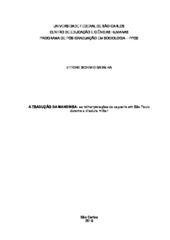A Tradução da Mandinga: processo de reinterpretação da capoeira em São Paulo durante a ditadura militar
Abstract
Capoeira is a cultural / sports practice that carries various elements of African diasporic experience in Brazilian society, and constitutes a field of dispute where different struggles that divide the Brazilian society are played. In orality, musicality and corporeality, it is characterized as a black popular culture that responds to the various historical moments. The research aims to understand the reinterpretations that emerged in the São Paulo capoeira from 1964 to 1978, when the masters reinterpreted the practice as a Brazilian martial art. These creations decisively influenced the projection of capoeira, with its presentation at the Festival of Black Arts in Dakar - Senegal in 1966; his recognition as a national sport in 1972 and; the creation of the Paulista Federation of Capoeira in 1974. The qualitative dissertation, using oral history as the main research tool, developed participant observations and open interviews with the masters of capoeira identified as relevant in the process approached. Based on the African Diaspora Studies, Cultural Studies and Postcolonial Studies, the analysis aims to study the identity processes of the cut-off period, with a radical historicization. Also used were works on capoeira, military dictatorship, documents, videos and photos to assist in the historical reconstruction of the period. The work shows that the leaderships, crossed by the practice of capoeira and the process of migration, reinsert their social condition when translating capoeira as a sport in the cut out period. This movement resulted in a field of convergence, culminating in the organization of capoeira as a trade, with championships and theatrical spectacles, permeated by political alliances. These alliances, loaded with ritual reinterpretations and Cultural Translation of Bahian capoeira, will place a tension between the identity constructions of Brazilian society in the historical period cut. These identities, disputed and played inside the capoeira, will result in the emergence of the Capoeira denominated Contemporary.
